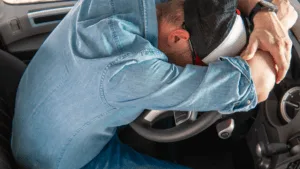Are you tired of dealing with unexpected trailer problems while on the road? Look no further! Our Trailer Troubleshooting Guide is here to help you identify and fix issues on the go, so you can get back to your journey without any hiccups. Say goodbye to stressful breakdowns and hello to smooth sailing – let’s dive in and tackle those pesky trailer issues together!
5 Safe driving practices for truckers
Common issues with trailers and their causes
Common issues with trailers can cause a lot of frustration for anyone planning to hit the road. Whether you’re hauling cargo or heading out on a camping trip, it’s essential to have your trailer in top working condition. However, even with proper maintenance, trailers can encounter problems that may leave you stranded on the side of the road.
1. Flat Tires: One of the most frequent problems faced by trailer owners is flat tires. These can be caused by various factors such as overloading, under-inflation, or punctures from debris on the road. It’s crucial to regularly check your tire pressure and ensure that they are inflated to the recommended level.
2. Electrical Malfunctions: Electrical malfunctions are another prevalent issue with trailers and can be caused by a faulty battery or wiring system. If your lights aren’t working correctly or if there’s no power reaching your trailer’s brakes, it could indicate an electrical problem. Regularly checking and maintaining your battery and wiring connections can help prevent these issues.
3. Brake Problems: Brake issues can be extremely hazardous while towing a trailer since they affect stopping distance and control over your vehicle. Some common causes include worn brake pads, air in brake lines, or malfunctioning brake controllers.
4.Grease Leaks: Grease leaks are often overlooked but can cause serious damage if left unaddressed. These leaks typically occur due to worn bearings or damaged seals which allow grease to escape from its designated area within the wheel hub assembly.
5. Trailer Sway: Trailer sway is a common issue that occurs when the trailer starts to move from side to side, making it difficult to control the vehicle. This problem can be caused by various factors such as poor weight distribution, incorrect tire pressure, or high winds.
Tools and equipment needed for on-the-go repairs
Being prepared with a well-stocked toolkit will not only save you time and money, but also ensure that you are able to quickly fix any issues that may arise while on the road. The following is a list of essential tools and equipment that every trailer owner should have for on-the-go repairs:
1. Basic Hand Tools: It’s important to have a set of basic hand tools such as screwdrivers, pliers, wrenches, sockets, and hammers. These tools will come in handy for various tasks such as tightening bolts and screws or removing parts for inspection.
2. Multimeter: A multimeter is an essential tool for troubleshooting electrical issues on your trailer. This device helps you check voltage levels, continuity, and resistance in circuits which can help pinpoint any faults.
3. Spare Parts: Keeping spare parts like fuses, light bulbs, nuts, bolts, and other common items can be a real lifesaver when something breaks down unexpectedly. Make sure to keep these items organized in your toolkit so they are easily accessible when needed.
4. Tire Repair Kit: Flat tires are one of the most common issues faced by trailer owners while on the go. Having a tire repair kit with puncture plugs, patches, tire levers, and an air compressor can help you fix a flat tire quickly without having to call for assistance.
5. Jacks and Stands: A jack is necessary for lifting your trailer off the ground in case of a flat tire or other repairs underneath the vehicle. Stands are also useful for propping up heavy parts while working on them.
Equipped for the Road: Top 6 Essential Tools for Every Mobile Truck Driver
Step-by-step guide to troubleshoot common issues
1. Start with a visual inspection: The first step in troubleshooting any issue is to visually inspect your trailer. Look for any obvious signs of damage, wear and tear, or loose parts. This may include checking the tires for proper inflation, examining the lights and electrical connections, and inspecting the hitch and safety chains.
2. Check your brake system: If you are experiencing braking issues, start by checking your brake system. Make sure the brake fluid levels are correct and that there are no leaks or damaged lines. You can also try manually applying the brakes to see if they engage properly.
3. Test your lights: A common issue with trailers is malfunctioning lights. To troubleshoot this problem, check all the bulbs to ensure they are not burnt out or loose. Also, test the electrical connections by using a tester or plugging in a different trailer to see if it works.
4. Inspect your suspension system: If you notice excessive bouncing while driving or uneven tire wear, it could indicate an issue with your suspension system. Check for any broken or worn-out components such as leaf springs, shocks, or bushings.
5. Troubleshoot hitch problems: If you have difficulty connecting or disconnecting your trailer from the towing vehicle, there could be an issue with your hitch system. Make sure all parts are lubricated and free of debris that could hinder movement.
6. Address battery problems: A dead battery can cause a lot of issues like malfunctioning lights and power jacks not working correctly. Check the battery connections for corrosion and make sure they are tight.
Tips for preventing trailer issues while on the road
To help prevent any potential problems from arising, here are some valuable tips for preventing trailer issues while on the road.
1. Complete Regular Maintenance Checks: Regular maintenance checks are crucial in ensuring that your trailer is in good condition before hitting the road. This includes inspecting the tires for wear and tear, checking the suspension, brakes, lights, and other important components.
2. Distribute Weight Evenly: Proper weight distribution is essential for safe towing and to prevent any strain on your vehicle or trailer. Make sure to evenly distribute weight by placing heavier items towards the front of the trailer and lighter items towards the back.
3. Secure All Loose Items: Before setting off, make sure all loose items inside your trailer are secured properly to avoid shifting around during transit. You don’t want anything falling out or causing imbalances that could lead to handling issues.
4. Jack Up Your Trailer Before Loading/Unloading: When loading or unloading heavy equipment onto or off your trailer, it’s best to use jacks rather than relying solely on your vehicle’s suspension system. This helps prevent overloading and minimizes stress on both your vehicle and trailer.
5.Check Tire Pressure Regularly: Having proper tire pressure is essential for safe towing as under-inflated tires can cause blowouts or uneven wear which can lead to handling problems while driving.
5 Benefits of professional truck washing
When to call for professional help
When embarking on a road trip with a trailer, it is important to be prepared for any potential issues that may arise. While some minor problems can be fixed easily by the driver, there are certain situations where calling for professional help is necessary. In this section, we will discuss when it is appropriate to call for professional assistance and how to handle these situations.
1. Tire Issues: One of the most common problems that can occur while towing a trailer is tire-related issues. This can include flat tires, blowouts, or even damage to the sidewalls. In such cases, it is crucial to assess the severity of the problem before making any decisions. If you have basic knowledge about changing tires and have all the necessary tools at hand, then you may attempt to fix it yourself.
2. Electrical Problems: Another issue that may require professional help is electrical problems with your trailer’s lighting system. This could include malfunctioning brake lights or turn signals, which not only pose a safety hazard but also violate traffic laws in most states. If you notice any issues with your trailer’s electrical system while on the road, stop immediately and check if there are any blown fuses or loose connections that you can fix yourself.
3. Hitch Malfunction: The hitch is what connects your trailer to your vehicle and ensures safe towing while on the road. Therefore, any malfunction with this component should be taken seriously and handled properly. It could be as simple as a loose bolt or as serious as a broken hitch bar or coupler latch.
4.Vehicle Overheating: Towing a heavy load can put a strain on your vehicle’s engine, causing it to overheat. This is especially true for older vehicles or those that are not equipped for towing. If you notice your temperature gauge rising while driving, pull over immediately and let the engine cool down.
Essential items to have in your trailer emergency kit
Whether you’re a seasoned traveler or new to towing, here are some must-have items for your trailer emergency kit.
1. Tire Repair Kit: One of the most common issues that trailer owners encounter is a flat tire. Having a tire repair kit in your emergency kit can save you from being stranded on the side of the road. Make sure your kit includes a spare tire, jack, lug wrench, and a tire pressure gauge.
2. Jumper Cables: Dead batteries are another common problem with trailers, especially if they’ve been sitting for an extended period. Keep jumper cables in your emergency kit so you can jump-start your battery if needed.
3. Duct Tape and Zip Ties: These versatile items can come in handy for temporary repairs until you reach professional help. Duct tape can be used to patch small holes or tears in awnings or tents, secure loose wires or connections, and even temporarily fix broken windows.
4. Basic Tools: Having a set of basic tools such as screwdrivers, pliers, and an adjustable wrench can be useful for making simple repairs on the go.
5. First Aid Kit: No matter where you’re traveling with your trailer, accidents happen, and it’s always better to be prepared than caught off guard without proper medical supplies. Your first aid kit should include bandages, gauze pads, antiseptic wipes or spray, pain relievers like aspirin or ibuprofen, allergy medication (in case of insect bites), and any necessary prescription medications.
In addition to these essential items, you may also want to include a fire extinguisher, rain poncho, drinking water, non-perishable snacks, and a map or GPS device in your emergency kit. Remember to check and restock your trailer emergency kit regularly before each trip to ensure that all items are up-to-date and in good condition. With the right tools at hand, you’ll be better equipped to handle any unexpected issues that may arise while towing your trailer.
For more tips and info, follow us on Facebook and Instagram. Call us for truck repair road service on: elluminatemobiletruckrepair.com






